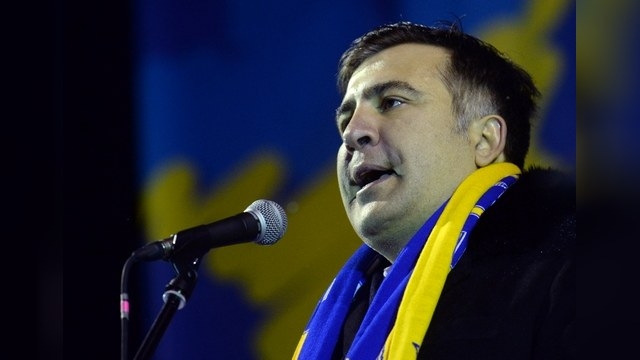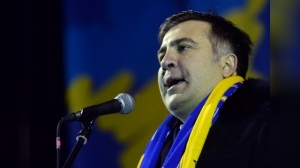Saakashvili Eyes National Role as Ukraine’s Political Crisis Intensifies
KYIV – Amid a deepening political crisis in Ukraine, Georgia’s former president and current governor of his adopted homeland’s Odessa Region, Mikheil Saakashvili could officially wade into Ukraine’s famously combative national political arena by creating a new anti-corruption party with several of his ideological allies.
Saakashvili – who served as Georgia’s president from 2004-2013 – has sat in Odessa’s gubernatorial chair since May 2015 after Ukrainian President Petro Poroshenko appointed him in the hope that Saakashvili would replicate many of the anti-corruption and pro-business policies that marked the early period of his presidency.
Odessa’s shipping and stevedoring industries are considered major cash cows for the Ukrainian government, which is beset by crippling debt and high inflation two years after the Maidan Revolution ousted pro-Russian former President Viktor Yanukovich. Russia’s subsequent invasion and annexation of Crimea and the ensuing war in the country’s eastern Donbass region has left 10,000 dead and half a million as refugees.
Poroshenko has made limited attempts to stem the time of economic blowback caused by the on going conflict. By granting Ukrainian citizenship to his old friend and former university classmate, he guaranteed Saakashvili’s appointment to the country’s most important economic zone.
The conventional wisdom at the time of his appointment was that Saakashvili’s brand of heavy-handed, anti-corruption policies and tactics would lead to a cleansing of the notoriously crime-ridden business landscape in Odessa, a city that has long been home to some of the Russian-speaking world’s most dangerous and powerful organized crime syndicates.
Furthermore, Poroshenko and his allies hoped Saakashvili’s reformist bona fides – forged from his time as Georgia’s staunchly pro-Western, pro-NATO president – would lead to a major transformation of the crippling Soviet-era bureaucracy in the Odessa region.
Saakashvili has succeeded in overhauling the Port of Odessa – the region’s main source of revenue – by reforming the once corrupt customs offices. He’s paid close attention to changing the face of port’s administration by bringing in a staff of mostly young, attractive, English-speaking Ukrainian women to handle the day-to-day operations of the port.
Yulia Marushevskaya, the 26 year-old poster girl of the Maidan Revolution who gained Internet fame with her impassioned “I am Ukrainian” YouTube video at the height of the protests, was been personally tasked by Saakashvili to oversee his reforms at Odessa’s port as its Chief Customs Officer.
While the overall investment mood in Odessa has slowly improved, largely due to Saakashvili’s exhaustive media campaigns where he touts various accomplishments, his drive toward turning the region into a model of clean government and good business has been mixed.
In October 2015, his handpicked choice to be Odessa’s mayor, Alexander Borovik, was resoundingly rejected by Odessa’s voters in favour of a candidate closely linked to Saakashvili’s two main rivals, Interior Minister Arsen Avakov and Ukraine’s richest and most powerful oligarch, Igor Kolomoysky.
Borovik, a Harvard-educated lawyer and former Microsoft executive, perfectly fit the profile of the type of young Western-oriented reformer the Maidan movement had hoped to sweep into power after overthrowing the oppressive and corrupt Yanukovich regime.
He and other like-minded free market, rule-of-law politicians wanted the country to embark on a widespread purge of Ukraine’s graft-plagued political and judicial institutions.
His close association with Saakashvili, however, cost Borovik significant political capital in Odessa, as voters and entrenched business interests feared an increasingly empowered Saakashvili’s control over both the gubernatorial and mayoral offices.
Georgia’s Footprint on Ukrainian Politics
Saakashvili and his close allies from his presidential term are a major component of the current Ukrainian government. They have, however, been largely stymied by the deeply entrenched body politic that has hindered Ukraine’s development since the collapse of the Soviet Union.
While Saakashvili, himself, has seen mixed returns during his short tenure as Odessa governor, his Georgian lieutenants within the national government have had a measure of success.
Eka Zguladze, Ukraine’s deputy interior minister, has been lauded for her highly effective role in the retraining and rebranding of the once-criminally corrupt municipal police. Law enforcement bodies in the years leading up to the Maidan Revolution were seen as little more than criminal organizations with ties to petty local mafia and Russia’s FSB security services.
Under the guidance of Zguladze’s – who served in the same role in Georgia as part of Saakashvili’s government – the police force has undergone a major transformation through Western training and mass influx of new recruits, one third of who are women.
Deputy Prosecutor General David Sakvarelidze, one of the Ukrainian government’s most vocal reformers, has seen his efforts to prosecute or investigate corrupt officials thwarted by his controversial boss, Prosecutor General Viktor Shokin.
Shokin is widely seen as a staunch ally of Ukraine’s power hungry oligarch class, who has deep business and political connections to strategic state organs, including the justice and interior ministries.
Pro-Russian oligarchs Rinat Akhmetov and Sergey Taruta – two of the country’s richest and most powerful men who financially supported Moscow-backed separatists in their home Donbass region – have been accused by local media, Sakvarelidze and Saakashvili, himself, of having ties to Shokin.
Sakvarelidze – President Saakashvili’s prosecutor general in Georgia – has seen his attempts to curtail the influence of Viktor Medvedchuk – another in Ukraine’s long list of powerful oligarchs and leader of the pro-Russian Ukraine’s Choice party, whose daughter Darina is the goddaughter of Russian President Vladimir Putin – have been derailed by the prosecutor general’s office.
Medvedchuk, a former KGB informant and lawyer charged with prosecuting Soviet dissidents, is deeply distrusted as a traitor by the Ukrainian public due to his ties to Putin and Russia’s business class.
Fearing a political backlash from the oligarchs, Poroshenko has done little towards pursuing Saakashvili’s push for transparent government. Out of respect for their two decade-old friendship, and his intense loyalty to Poroshenko, Saakashvili has refrained from criticizing Poroshenko directly, instead turning his wrath on Shokin, Avakov and Kolomoysky.
In a series of ill-tempered public outbursts, Saakashvili has consistently castigated the trio, including an exchange on live TV where he and Avakov accused each other of corruption and threatened one another with physical violence before Avakov unceremoniously threw a full glass of cold water at Saakashvili.
Gambling on His Political Future
With both Poroshenko and embattled Prime Minister Arseny Yatsenyuk fighting for their political lives as public support vanishes amid stalled reforms and the continued presence of thousands of Russian combat troops in the country’s east, Saakashvili hopes to fill the political void through a major realignment of the current party structure.
Since late 2015, Saakashvili, Borovik and other associates have been on an extensive outreach campaign across the country, holding anti-corruption forums and touting their self-styled Movement for Cleansing.
Borovik, who now serves as Saakashvili’s deputy governor in Odessa, announced on 14 March that the movement plans to take part in the next parliament election as an official political party.
While Saakashvili was quick to deny Borovik’s claim, several members of Poroshenko’s political bloc confirmed to local media that the Movement for Cleansing will eventually consolidate into a national political party.
With early parliamentary elections likely, Saakashvili is staking his political career in Ukraine on developments over the next several months.
He is barred from being an elected official, as he only received his Ukrainian citizenship in 2015. Legislation requires a presidential or parliamentary candidate to have held Ukrainian residency for five years before being elected.
Poroshenko is unlikely to appoint Saakashvili as prime minister due to a lack of support in the parliament, and will most likely turn to his popular US-born Finance Minister Natalie Jaresko to head a pro-Western, reform-minded technocratic government.
The Chicago native is highly regarded by investors and Ukraine’s international partners for her sharp-witted, no-nonsense approach towards key structural reforms.
Saakashvili, however, could wield significant power as the leader of a new political party whose popularity is steadily on the rise and whose platform appeals to many Ukrainians tired of 20 years of broken promises and Soviet-style government.












